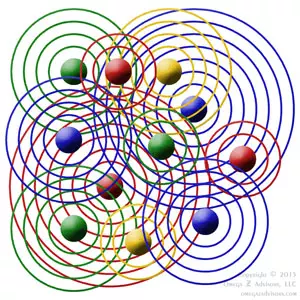Personality Types Using Power and Politics in the Workplace
Underneath the how to deal with office politics is power. There is a close link between power and politics in the workplace. Power gives influence. Influence affects office politics. What are office politics but relationships?
There are many types of power. Too often though experts generalize them. We get a small list. From it they expect us to extrapolate (or to hire them to see) other powers.
I do not like to bury them under broad headings just so I have nice, neat groups. I like to detail them. This better helps people to see their power. To make it clearer I link each power with a personality type.

To understand better power and politics in the workplace, we need to look at it as influence and relationships in the workplace.
Power and Politics in the Workplace
Power and politics in the workplace is about relationships. There are two aspects to any relationship: rational and intuitive. There are powers that apply to each.
Rational power hits our heads. It is thoughtful, tangible and visible. Intuitive power hits our hearts. It is moving, intangible and invisible.
We all possess power. There are not only different types. Each type comes in different degrees. Some powers are more unique to us than others.
This makes for problems though. Some can make their power seem more unique, more special if they keep us blind to ours. Burying powers behind broad headings helps them do this.
Glossary of Powers and Personality
Almost all people have more than a couple types of power. They vary by person, role and circumstance. Below is a glossary of a few powers. It names the power and the personality type. It then tells briefly from where each power comes.
Rational Power
- Hierarchical Power = Ruler: coming from position and rules in an organization
- Coercive Power = Coercer: using negative reinforcements to force behavior
- Credentialed Power = Expert: possessing degrees, awards, certificates granted by others
- Technical Power = Technician: having the skill to use a tool, concept or process
- Implemental Power = Doer: accomplishing through action
- Physical Power = Exerciser: coming from the body and what it can do
- Transactional Power = Transactor: having things to exchange
- Knowledgeable Power = Knower: possessing or having access to knowledge
- Organizational Power = Organizer: coordinating, integrating, categorizing
- Representational Power = Representative: coming from group, team or peers
- Expressive Power = Communicator: conveying thoughts, emotions and actions
- Teaching Power = Trainer: helping others learn
Intuitive Power
- Assertive Power = Initiator: getting things started, taking first steps
- Relational Power = Relator: building relationships, bonding regardless of differences
- Motivational Power = Motivator: moving others to take action
- Decisional Power = Decider: having emotional makeup to make decisions
- Attractive Power = Attractor: possessing attributes that others find appealing
- Homogeneous Power = Homogenizer: coming from homophily, similarity to others
- Empathetic Power = Empath: feeling emotional state of the group
- Creative Power = Creator: coming up with new ideas, artworks, innovations
- Communal Power = Communalist: bonding a group or community with spirit of team
- Sycophantic Power = Sycophant: gaining favor of those with power
- Confident Power = Believer: knowing through strong belief
- Inspirational Power = Inspirer: helping others to feel differently
Using Power and Politics in the Workplace
When it comes to using power and politics in the workplace, it helps to see office politics as relationships. That allows us to reframe as using power and relationships in the workplace.
Using relationships at work is often key to doing things. We cannot avoid them. Our power influences them.
We all have influence. We all have work relationships. We all use our influence and relationships. We just do not see it as power and politics in the workplace. We are blind. Others profit from that.


